疯狂英语阅读:LIVINGONMARS
Living_on_Mars解读
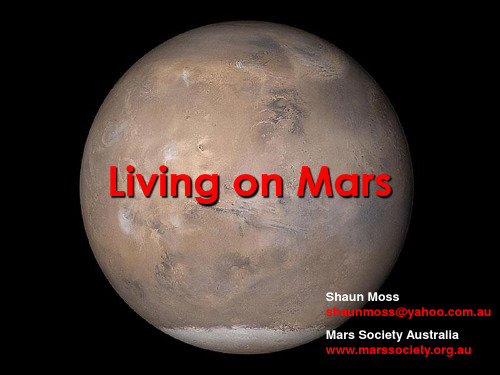
Air
Earth: 20% O2, 80% N2 Can make air like this on Mars! N2 from Mars’ atmo O2 from:
CO2 H2O Fe2O3, SiO2, etc.
Recycle using plants (photosynthesis)
Food
Living on Mars
Shaun Moss shaunmoss@.au Mars Society Australia .au
Living on Mars
1. Earth and Mars 2. Why would we want to live on Mars? 3. The challenges of living on Mars 4. What will we need, and how can we get all these things? 5. Health & Fitness 6. Terraforming
Terraforming
Making Mars’ environment hospitable to organisms from Earth.
Warming Mars
Create global warming using PFCs (perfluorocarbons) – a powerful greenhouse gas. Use mirrors in space to reflect more sunlight onto Mars. Heating Mars causes frozen CO2 to sublime, thickening atmo and causing more warming – a runaway greenhouse.
住在火星的英文作文

住在火星的英文作文英文:Living on Mars is a dream come true for me. As an astronaut, I have always been fascinated by the idea of exploring new worlds and discovering new things. Mars has always been a favorite destination for me, and now that I am actually living here, I feel like I am living in a science fiction movie.The first thing that strikes me about living on Mars is the scenery. The red rocks and the vast, open plains are breathtaking. I feel like I am living in a completely different world. The sunsets are also amazing. The sky turns shades of pink and orange that I have never seen before.Another thing that I love about living on Mars is the sense of community. We are all here for the same purpose, and we work together to make this planet our home. We haveto rely on each other, and that has brought us closer together. We have become like a family.One of the biggest challenges of living on Mars is the isolation. We are so far away from Earth, and we can't just hop on a plane and go home if we get homesick. But we have found ways to cope with this. We have movie nights and game nights, and we talk to our families back home as often as we can. We also have a great support system here on Mars. We are all in this together.Overall, living on Mars has been an incredible experience. It has been challenging, but it has also been rewarding. I feel like I am part of something bigger than myself, and that is an amazing feeling.中文:住在火星对我来说是一个梦想成真。
live on mars作文

live on mars作文Title: Living on Mars - A Dream or a Reality?Title: 火星生活- 梦想还是现实?Text:Text:Ever since humans first gazed up at the night sky, the red planet Mars has captivated our imagination.The idea of living on Mars has gone from 科幻小说to a potential reality that may soon become a possibility.With advancements in technology and space exploration, the dream of setting foot on Mars is closer than ever before.自从人类首次仰望夜空,红色的星球火星就俘获了我们的想象力。
生活在火星上的想法从科幻小说变成了可能很快成为现实的潜在可能性。
随着科技和太空探索的发展,踏上火星的梦想比以往任何时候都更接近了。
However, living on Mars is not an easy task.The planet is known for its extreme temperatures, lack of breathable air, and high radiation levels.Despite these challenges, scientists and engineers around the world are working tirelessly to make Mars a habitable place for humans.然而,生活在火星上并非易事。
这个星球以其极端的温度、无法呼吸的空气和高辐射水平而闻名。
住在火星上英文作文
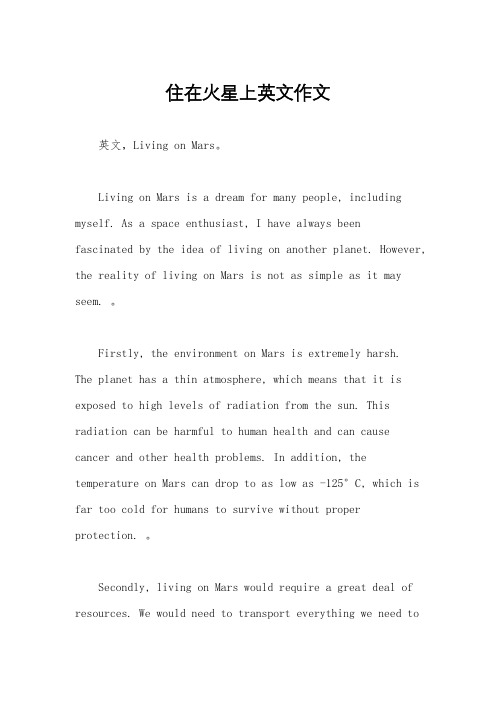
住在火星上英文作文英文,Living on Mars。
Living on Mars is a dream for many people, including myself. As a space enthusiast, I have always beenfascinated by the idea of living on another planet. However, the reality of living on Mars is not as simple as it may seem. 。
Firstly, the environment on Mars is extremely harsh.The planet has a thin atmosphere, which means that it is exposed to high levels of radiation from the sun. This radiation can be harmful to human health and can cause cancer and other health problems. In addition, the temperature on Mars can drop to as low as -125°C, which is far too cold for humans to survive without proper protection. 。
Secondly, living on Mars would require a great deal of resources. We would need to transport everything we need tosurvive, including food, water, and oxygen. This would be a massive undertaking and would require a lot of funding. 。
疯狂英语读:LIVINGONMARS-(1)
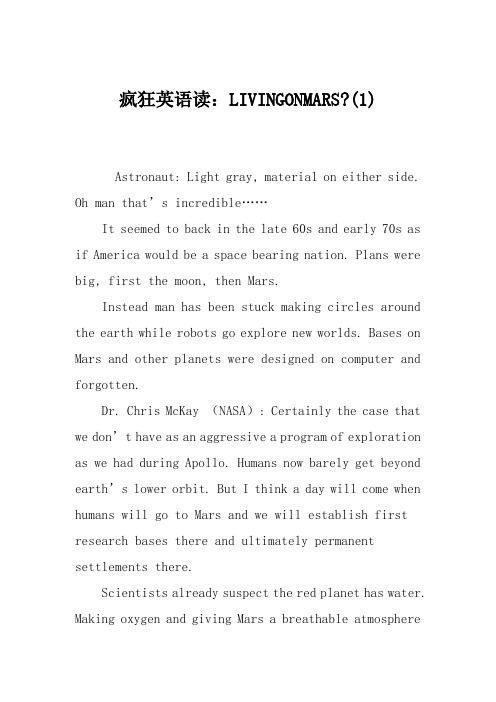
疯狂英语读:LIVINGONMARS?(1)Astronaut: Light gray, material on either side. Oh man that’s incredible……It seemed to back in the late 60s and early 70s as if America would be a space bearing nation. Plans were big, first the moon, then Mars.Instead man has been stuck making circles around the earth while robots go explore new worlds. Bases on Mars and other planets were designed on computer and forgotten.Dr. Chris McKay (NASA): Certainly the case that we don’t have as an aggressive a program of exploration as we had during Apollo. Humans now barely get beyond earth’s lower orbit. But I think a day will come when humans will go to Mars and we will establish first research bases there and ultimately permanent settlements there.Scientists already suspect the red planet has water. Making oxygen and giving Mars a breathable atmosphereis at least theoretically possible. Something scientists are seriously talking about at NASA’s Aims Research Center. It’s a symposium called “The Physics and Biology ofMaking Mars Habitable.” They’re looking at ways Mars might be terra-formed and asking important questions not just, can we? but “hould we?” Is Mars ours to mess with? Is it ethical to bring life to Mars?Chris: I come down squarely on the side of life.I think Mars without life is a great place. It’s very interesting but Mars with life is even more interesting, more fascinating. And in a philosophical sense, more valuable.Now scientists first have to figure out if there is life on Mars or perhaps there was some time before. If that’s true, that would add a whole new ethical quandary. Some of the ideas for terra forming perhaps sending atomic bombs to Mars and exploding them in the atmosphere. That would cause the greenhouse effect and begin the terra forming. Now there are no specific plans to do that. NASA is just studying the idea.。
livein mars英语作文
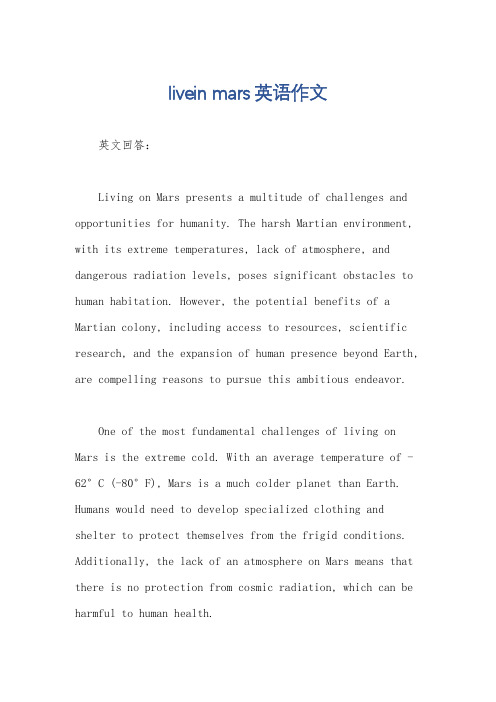
livein mars英语作文英文回答:Living on Mars presents a multitude of challenges and opportunities for humanity. The harsh Martian environment, with its extreme temperatures, lack of atmosphere, and dangerous radiation levels, poses significant obstacles to human habitation. However, the potential benefits of a Martian colony, including access to resources, scientific research, and the expansion of human presence beyond Earth, are compelling reasons to pursue this ambitious endeavor.One of the most fundamental challenges of living on Mars is the extreme cold. With an average temperature of -62°C (-80°F), Mars is a much colder planet than Earth. Humans would need to develop specialized clothing and shelter to protect themselves from the frigid conditions. Additionally, the lack of an atmosphere on Mars means that there is no protection from cosmic radiation, which can be harmful to human health.Another major challenge is the lack of water. While there is evidence of frozen water on Mars, it is mostly in the form of ice caps and aquifers deep below the surface. Extracting and purifying this water would be a complex and energy-intensive process. Moreover, the lack of a magnetic field on Mars means that the planet is more susceptible to solar radiation, which can break down water molecules and create harmful byproducts.Despite these challenges, there are also numerous potential benefits to living on Mars. One of the most significant is the access to resources. Mars has vast deposits of minerals, including iron, aluminum, and titanium, which could be used for construction, manufacturing, and other industrial purposes. Additionally, Mars has an abundance of frozen carbon dioxide, which could be converted into fuel for rockets and other vehicles.Another benefit of living on Mars is the scientific research opportunities. Mars is a relatively unexplored planet, and its study could yield valuable insights intothe origins of life, the evolution of the solar system, and the potential for life beyond Earth. The presence of human scientists on Mars would enable a wide range of research projects, including the study of the Martian atmosphere, geology, and possible indigenous life forms.Finally, living on Mars represents a significant expansion of human presence beyond Earth. By establishing a colony on Mars, humanity would take a major step towards becoming a multi-planetary species. This would provide a backup in case of a global catastrophe on Earth and increase our chances of long-term survival.中文回答:生活在火星上对于人类来说既充满了挑战,也充满了机遇。
life on mars英语作文

life on mars英语作文Life on Mars。
Imagine a world where the sky is red and the ground is covered in rusty, orange soil. This is the reality of life on Mars, a planet that has captivated the imagination of scientists and explorers for decades.In this alien landscape, the possibility of finding evidence of past or present life has fueled numerous missions to Mars. From the rovers that tirelessly roam the surface, to the ambitious plans for human colonization, the quest to uncover the secrets of this enigmatic planet continues to drive innovation and discovery.The challenges of living on Mars are immense. The thin atmosphere and lack of a magnetic field leave the surface exposed to harmful radiation and extreme temperature fluctuations. Building sustainable habitats and finding ways to grow food in this harsh environment will be crucialfor any long-term human presence.Despite these obstacles, the allure of Mars persists. Its potential as a new frontier for humanity, as well asits scientific value in understanding the origins of lifein the universe, make it a tantalizing target for exploration.As we look to the future, the dream of establishing a thriving community on Mars remains within our grasp. Whether through the efforts of government space agencies or private companies, the prospect of witnessing the first human footsteps on the Martian surface is an exciting and inspiring vision.In the end, life on Mars may be a distant reality, but the journey to get there is a testament to the indomitable spirit of exploration and the boundless curiosity of the human race.。
homes on mars英语作文
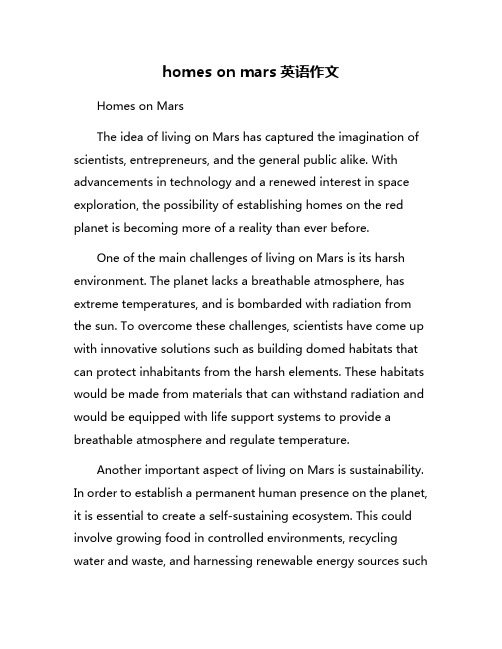
homes on mars英语作文Homes on MarsThe idea of living on Mars has captured the imagination of scientists, entrepreneurs, and the general public alike. With advancements in technology and a renewed interest in space exploration, the possibility of establishing homes on the red planet is becoming more of a reality than ever before.One of the main challenges of living on Mars is its harsh environment. The planet lacks a breathable atmosphere, has extreme temperatures, and is bombarded with radiation from the sun. To overcome these challenges, scientists have come up with innovative solutions such as building domed habitats that can protect inhabitants from the harsh elements. These habitats would be made from materials that can withstand radiation and would be equipped with life support systems to provide a breathable atmosphere and regulate temperature.Another important aspect of living on Mars is sustainability. In order to establish a permanent human presence on the planet, it is essential to create a self-sustaining ecosystem. This could involve growing food in controlled environments, recycling water and waste, and harnessing renewable energy sources suchas solar power. By creating a closed-loop system, inhabitants of Mars can reduce their reliance on Earth for essential resources and minimize the impact of their presence on the planet.In addition to the challenges of the Martian environment, there are also psychological and social considerations to take into account. Living on Mars would involve being isolated from Earth for extended periods of time, which could have implications for mental health and well-being. Establishing a sense of community and support among inhabitants would be crucial for maintaining morale and ensuring the success of the mission.Despite these challenges, the prospect of living on Mars offers exciting opportunities for exploration and discovery. By establishing homes on the red planet, humans could unlock the secrets of our solar system and pave the way for future interplanetary colonization. It is a bold vision that requires collaboration, innovation, and determination, but the rewards could be monumental.In conclusion, the idea of homes on Mars is no longer a distant dream, but a tangible goal that is within reach. With advancements in technology and a growing interest in space exploration, the possibility of establishing a human presence onthe red planet is closer than ever before. By overcoming the challenges of the Martian environment, creating a sustainable ecosystem, and addressing the psychological and social aspects of living in space, we can turn this vision into a reality. The future of humanity may lie not just on Earth, but also among the stars.。
- 1、下载文档前请自行甄别文档内容的完整性,平台不提供额外的编辑、内容补充、找答案等附加服务。
- 2、"仅部分预览"的文档,不可在线预览部分如存在完整性等问题,可反馈申请退款(可完整预览的文档不适用该条件!)。
- 3、如文档侵犯您的权益,请联系客服反馈,我们会尽快为您处理(人工客服工作时间:9:00-18:30)。
疯狂英语阅读:LIVINGONMARS?
Astronaut: Light gray, material on either side. Oh man
that's incredible...
It seemed to back in the late 60s and early 70s as if America would be a space bearing nation. Plans were big, first the moon, then Mars.
Instead man has been stuck making circles around the earth while robots go explore new worlds. Bases on Mars and other planets were designed on computer and forgotten.
Dr. Chris McKay (NASA): Certainly the case that we don't have as an aggressive a program of exploration as we had during Apollo. Humans now barely get beyond earth's lower orbit. But I think a day will come when humans will go to Mars and we will establish first research bases there and ultimately permanent settlements there.
Scientists already suspect the red planet has water. Making oxygen and giving Mars a breathable atmosphere is at least theoretically possible. Something scientists are seriously talking about at NASA's Aims Research Center. It's a symposium called "The Physics and Biology ofMaking Mars
Habitable." They're looking at ways Mars might be
terra-formed and asking important questions not just, can we? but "hould we?" Is Mars ours to mess with? Is it ethical to bring life to Mars?
Chris: I come down squarely on the side of life. I think Mars without life is a great place. It's very interesting but Mars with life is even more interesting, more fascinating. And in a philosophical sense, more valuable.
Now scientists first have to figure out if there is life on Mars or perhaps there was some time before. If that's true, that would add a whole new ethical quandary. Some of the ideas for terra forming perhaps sending atomic bombs to Mars and exploding them in the atmosphere. That would cause the greenhouse effect and begin the terra forming. Now there are no specific plans to do that. NASA is just studying the idea.
移居火星?
宇航员:两边都是浅灰色一片。
天啦,太令人难以置信了......
这看起来像回到了六十年代末和七十年代初,美国要上太空的时代。
规模宏大的计划,首先登月,然后是火星。
在机器人开始探索一个崭新的世界的时侯,实际上人们还停留在围绕地球旋转的阶段,用电脑设计出建立在火星和其他星球上的基地,接着又是遗忘。
克里斯·麦凯博士(美国宇航局研究员)∶当然这个开发计划比不上阿波罗登月时代的规模。
人类现在很少飞越地球的低轨道。
但我想,总有一天人类会到火星上建立起第一个研究基地,并最终在那里建立永久的定居点。
科学家已经猜测这颗红色的行星上有水。
制造氧气和让火星拥有可供呼吸的空气至少在理论上是可行的。
在美国宇航局的研究中心,科学家们正在认真地谈论着一些事情--一场名为"让火星适合人类居住的物理学和生物学"的讨论会。
他们考虑在火星上"植地"的方法,他们所问的关键性问题不是仅仅"我们能否移居火星?"的问题,而是问"我们是否应该移居火星?"的问题。
我们有权移居火星吗?将生命带到火星是否道德?
克里斯∶我赞成移居火星。
我觉得,没有生命的火星是一个好地方,非常有趣。
但有了生命的火星更有趣,更美丽。
从哲学意义上说,更有价值。
现在科学家正在推测火星上是否有生命,或者曾经有过。
如果这是真的,那就真的在道德上陷入两难的境地。
一些土地形成的观点是将原子弹送上火星,在空气中引爆。
这会引起温室效应,继而形成土地。
现在还没有具体的计划。
美国宇航局正在研究这个观点。
【。
